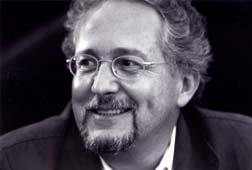
Héctor Abad
Héctor Abad Faciolince was born in Medellín, Colombia, in 1958. He studied Journalism at the University of Antioquia and Medicine and Philosophy at the Pontificia Bolivariana University, from which he was expelled after writing a disrespectful article about the Pope. He then studied Modern Languages at the University of Turin and worked as a lecturer of Spanish at the University of Verona until 1992. Upon returning to Colombia he worked as translator (translating, for example, Tomasi di Lampedusa and Eco) and as journalist for various national magazines, among them »Cromos«, »El Malpensante« and »Cambio«, the latter co-founded by Gabriel García Márquez. In his short stories and novels Abad often focuses on the personality of the narrator and the act of narration in its pursuit of protection and power. In »Asuntos de un hidalgo disoluto« (1994; Eng. »The Joy of Being Awake«, 1996) an ageing upper class Colombian looks back on his life of debauchery – and the failure of his high pretensions – through reminiscences to his younger lover. »Fragmentos de amor furtivo« (1998; t: Fragments of furtive love) adopts the framework of »The Book of One Thousand and One Nights« in modified form. A woman delays her lover’s departure by telling him stories of her past lovers. The novel »Basura« (2000; t: Garbage) seems to allude to real role models, such as the storytellers Kafka or Pavese who were unfit for life, and tells of a writer who tosses his works directly into the garbage can. His neighbour finds the texts and over time turns into an assiduous and diligent reader, to whom the many woes of being a writer are revealed. The act of writing and the role of the reader in literature are topics which are highlighted time and again. The novel was awarded the Primer Premio Casa de América de Narrativa Innovadora. »Tratado de culinaria para mujeres tristes« (1996; t: Culinary treatise for sad women), also translated into German, is neither a novel nor a collection of recipes, but rather a collection of sensitive reflections and sentences about unhappy moods and adequate exposure to them. »The magic formula – if useful at all – lies in its sound; healing effects result from the breath made by uttering the words.« With a love for droll turns of phrase, Abad blends melancholy with even-tempered irony in well-composed sentences. Echoes of Hyperrealism rather than Magical Realism are clearly present in his most recent novel, »Angosta« (2003; t: Narrow). In a fantastical parable of Colombian society, he describes a fictitious city where three different castes live on three separate planes. Against the backdrop of the violent perpetuation of this system, a kaleidoscope of eccentrics from the ruling class is depicted. The novel was awarded best Spanish language book of the year in China in 2004. The author lives in Berlin at present, a guest of the German Academic Exchange Service.
© international literature festival berlin
BIBLIOGRAPHY:
Malos pensamientos
Universidad de Antioquia
Medellín, 1991
The Joy of Being Awake
Lumen
Cambridge, Mass., 1996
[T: Nathan Budoff]
Fragmentos de amor furtivo
Alfaguara
Santafé de Bogotá, 1998
Asuntos de un hidalgo disoluto
Alfaguara
Santafé de Bogotá, 2000
Basura
Lengua de Trapo
Madrid, 2000
Oriente empieza en El Cairo
Mondadori
Barcelona, 2002
Angosta
Planeta Colombiana
Bogotá, 2004
Malos pensamientos
Universidad de Antioquia
Medellín, 1991
Fragmentos de amor furtivo
Alfaguara
Santafé de Bogotá, 1998
Asuntos de un hidalgo disoluto
Alfaguara
Santafé de Bogotá, 2000
Basura
Lengua de Trapo
Madrid, 2000
Kulinarisches Traktat für traurige Frauen
Wagenbach
Berlin, 2001
[Ü: Sabine Giersberg]
Oriente empieza en El Cairo
Mondadori
Barcelona, 2002
Angosta
Planeta Colombiana
Bogotá, 2004
Brief an einen Schatten
Berenberg
Berlin, 2009
[Ü: Sabine Giersberg]
Das Gedicht in der Tasche
Zwei Gedächtnisforschungen
Berenberg
Berlin, 2011
[Ü: Ulrich Kunzmann]
An beiden Ufern der Welt
Warum das Projekt Europa nicht aufgegeben werden darf
In: Lettre International 100
Berlin, Frühjahr 2013
[Ü: Ulrich Kunzmann]
